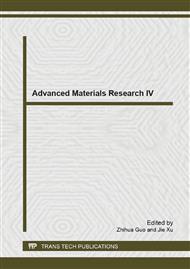p.275
p.280
p.284
p.288
p.293
p.300
p.305
p.311
p.316
Effects of Reaction Conditions on Low-Temperature Removal of Carbon Disulfide over Modified Coconut Shell Activated Carbons Catalysts
Abstract:
In this work, a series of modified coconut shell activated carbons (CSAC) catalysts were prepared by sol-gel method and used for catalytic hydrolysis of carbon disulfide (CS2) at low-temperatures. The influences of reaction conditions such as: reaction temperature, O2 concentration, relative humidity (RH), gas hourly space velocity (GHSV) and inlet concentration of CS2 on catalytic hydrolysis activities were studied. When the reaction temperature was 60°C, this catalyst showed the best catalytic performance and no better effect occurs with the increase of temperature. CS2 hydrolysis activities were decreased with increasing amounts of O2. When the RH was 30%, the catalyst manifests the best activity. The catalytic hydrolysis activities were decreased with increased of GHSV from 5000~20000h-1. In addition, when the inlet concentration of CS2 increased from 10ppm to 100ppm, the catalytic hydrolysis activities could be decreased.
Info:
Periodical:
Pages:
293-299
DOI:
Citation:
Online since:
February 2014
Authors:
Keywords:
Price:
Сopyright:
© 2014 Trans Tech Publications Ltd. All Rights Reserved
Share:
Citation:


